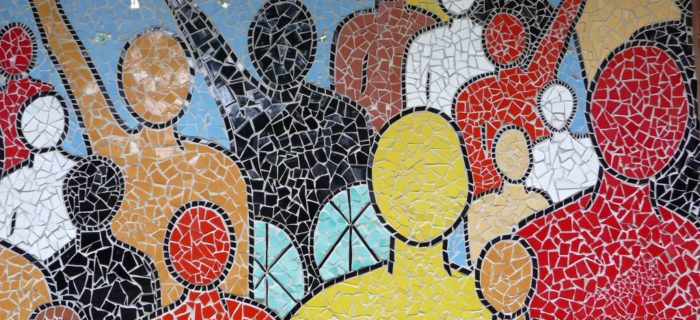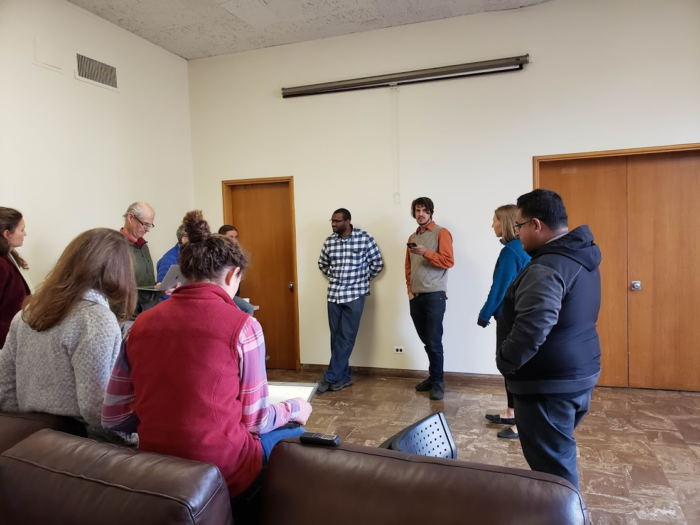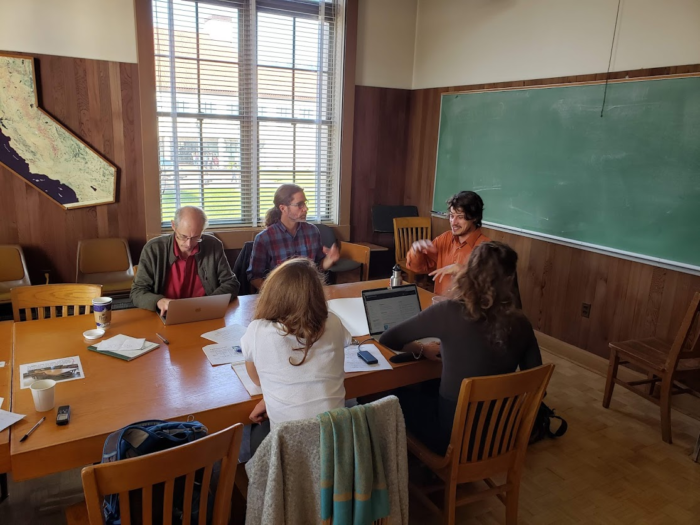Can Radical Researchers Get Their Act Together?
Download our PDF version of this publication here.
Members of the Agroecology Research-Action Collective (ARC) are trying to answer the question: how can we better support social movements?
Decades of neoliberal politics have created a tendency to approach social and environmental problems as individual(ist)s rather than as collectives. But collective struggle has been a mainstay of historical advancements in quality of life, human rights, democracy, and egalitarianism. After a seemingly deep hibernation, collective struggle is back! Or rather, it never left: it just may be that new struggles are gaining momentum and building power in a way that hasn’t been seen in decades.
From US protests in coal country and recent waves of teachers’ strikes, to mass organized struggles against austerity around the world, workers and communities are responding to harsh material conditions boldly, strategically, and collectively. While it may seem like these events are purely spontaneous reactions to negative conditions, in reality, they arise from an active and concerted collective effort to organize, build, and sustain power to achieve justice and transform the exploitative conditions communities and workers find themselves in.
So what does it look like when activist-scholars, embedded in academic institutions that foster a culture of individualism and competition, work to collectivize their efforts and support social movements fighting for systemic change?
In 2017, a group of food system researchers received a very specific recommendation from U.S. food sovereignty movement allies on how researchers could most effectively support food systems change. At a conference workshop on research-movement alliances, researchers were challenged to “get our house in order” and answer some fundamental questions: What are you willing to do? What are you willing to give? And when and where and how will you show up?
The authors of this Backgrounder (except Erik Hazard) were part of this group of researchers. The questions above are the ones our allies put to us— but they are questions that any group of people in any community can ask themselves on the path to organizing. They are critical questions because it is only through organizing, solidarity, and deep, reflective allyship that we can accomplish the changes we need for the challenges of today—not just in food systems, but across our social and economic systems.
Stay in the loop with Food First!
Get our independent analysis, research, and other publications you care about to your inbox for free!
Sign up today!We also saw the charge put to us as a vital opportunity to advance the collectivization of scholars. Like many other sectors of life, the “academy”—the national and international system of university-based research—has succumbed to the same neoliberal forces that have torn across the world for decades. The highly imperfect, class-riven “academy” has only become more hyper-individualized and commodified. As an institution, it is ever more committed to scholarship driven by grant dollars, patented products, and rich alumni, instead of visions of scholarship by, with, and for the people. In other words, while this piece considers our experience attempting to collectivize “scholars,” we have learned from the experiences of other sectors, and hope our experience can help inform anyone attempting to forge a stronger “we” in any sector.
What’s the Matter with the US? Agroecology Worldwide and in North America
Between 2014 and 2019, the Food and Agriculture Organization of the United Nations (FAO) held a series of meetings on agroecology—the first time multiple governments and non-governmental agencies had come together to discuss the key role of agroecology in the future of agriculture and food. These international meetings—organized for every world region but North America— raised a particular question for North America-based agroecology activists and researchers: where was “our” agroecology meeting? There is no question that our family farmers, farm laborers, eaters, and environment could all benefit from deepening agroecology and food sovereignty here.
In 2016, a group composed mainly of researchers began organizing towards a North American agroecology forum. Key challenges included: who could lead the organizing of a forum in North America? Who should lead? Who should be invited? And importantly: whom would the forum be for? How would the forum advance agroecology in North America beyond the narrow confines of research and academia?
Movement activists involved in agroecology in the United States expressed openness to the forum. But they needed researchers to get organized to answer those hard questions. Without a collectivity, researchers couldn’t give coherent answers. We realized that, with a collective space based on shared values and a joint vision for food system change, we could build power from the diversity of researchers’ experiences and perspectives in a way that wouldn’t be possible as individuals.
Getting Our House in Order: Struggles in a Struggle
It was clear that “getting our house in order” meant organizing our peers researching agriculture and food. But who should be included in this “house?”
While some academics follow a more traditional, institutional route—focusing on conducting and publishing research in the academy—others have focused more on work in communities, researching the best ways to resist and build better systems within specific contexts, and putting research to the test through action rather than publication. We also knew that some people conducting research come directly from communities at the frontlines of capitalist exploitation, expropriation, and resistance. And some of us fit multiple categories—not solely ‘scholar’ nor ‘activist.’
For our purposes, the Agroecology Research-Action Collective (ARC) decided that our collectivity should be built around those who identify themselves as researchers or scholars. Whether they were professionally employed as a researcher or not didn’t matter. Unsurprisingly, some of the most influential points of view in ARC have come from people decisively working outside of the formal research sector. We believe refusing to create a dividing line between “professional” and “non-professional” research has only strengthened ARC’s collectivity.
Becoming a Better We: What ARC Was Formed to Do
For ARC, the classic question of “who” we were quickly led to other basic tensions, like “what” ARC should be doing, and “how” we should be doing it. The enthusiasm we quickly saw from people seeking a space like ARC meant that we found ourselves with many choices on potential projects. Among choices, engaging with the Green New Deal (GND) emerged as an early priority.
Food system scholars and activists widely agreed that the GND didn’t really engage with existing analyses of sustainability and justice in the food system. Similarly, the GND was not engaging with the many potential solutions offered by food and farming movements. Some in ARC and some of our allies saw these concerns as a great place for ARC to start—working to demonstrate that there was sound science and established scholars behind climate-friendly food and agriculture proposals. But was this “what” ARC should be doing? How could we identify what ARC “should” be doing in the first place? How should we prioritize our collective work?
Learning by Doing
Composing an open letter to policymakers and the public on food and agriculture in the Green New Deal struck many of us as an obvious priority: there was clear social momentum around the GND, and clear gaps in the public conversation that ARC could help fill.
But one tension that this evoked was the lack of a shared analysis of what ARC’s highest priority work would look like, or how to identify it. One way to figure that out would be to devote more of ARC’s time as an organization talking through our ideas of how change happens, and working to get more of us “on the same page” on the best ways to create change. Then again, some argued that working together on projects like the GND would help us learn by doing—figuring out what we valued and prioritized, and how we should be doing it, through engaging in concrete work together. Otherwise, we could risk spinning our wheels discussing what the most important work theoretically looked like instead of accomplishing something and learning through that process.
The GND experience helped us begin to work through this tension. A subgroup of ARC worked over the course of several months to develop an open letter, titled “The Need for a Food and Agriculture Platform in the Green New Deal.” This delivered a “scholars’ statement” on food and agriculture and the GND that movement allies had specifically requested; gave ARC members an experience of working collectively to produce writing in coordination with movement allies; and was a platform for debate and conversation about tactics and priorities. At the same time, this exercise also showed some potential limits: producing the statement did not necessarily move us closer to understanding if ARC should engage in traditional policy advocacy and lobbying. Some members felt like the statement was lacking if there was no advocacy and organizing strategy behind it to lobby policymakers, while others felt we shouldn’t engage in policy at all. And everyone agreed that it was not clear what the “next steps” were for ARC, if indeed, there were any next steps.
Would ARC’s time have been better spent debating these questions outside the context of the GND statement? Did the GND take time away from strategizing, or did it give us a better chance to understand each other through concrete action and analysis? Can we keep momentum and our members’ interest if we spend too much time on debates instead of concrete work? And crucially, a core element of ARC is scholarship in service to and alongside movements: didn’t working on this letter with movement allies directly serve the relationship-building between scholars and movements in a way that talking internally about strategy could not?
These tensions continue, and ARC still does not have a clear consensus. But these experiences showed that there is a shared desire to build shared strategies based on long-term relationship building. And they further clarified that most of ARC’s challenges right now are not about values, but tactics and strategies.
One invaluable and regenerative element we’ve discovered in our work together has been the time spent building relationships with each other. Sharing our own experiences, our fears, our hopes, over food and drink (not just at meetings!) and in a spirit of comradery and respect for each other, across all of our diversity of thought and ways of being. In this way, some of the tensions became less… tense. We realized that we had a basis for being confident that we are on the road to resolving them, or living with them, while still getting things done.
Just the Beginning
Many tensions remain to be addressed. But in the process of working on projects like the GND, we reaffirmed our joint understanding that for ARC to do anything well, we should know ourselves better as a group. As we know ourselves and our allies better, the embodied trust and joint experience will give us a better basis to commit to joint struggles that match our interests, skills, and priorities. Such trust and experience themselves will allow us to better develop our internal processes.
It perhaps should not have been a surprise—but in going through our own processes of organizing, ARC has reminded itself that it is not enough to have the theories, the ideas, the values, and the passion for collective action for change. Organizing is a process that is both personal and collective, internal and external; it requires us to bring ourselves to the work as people, not just ideas. Learning by doing means making space for both: “doing,” but also coming back together to learn—not just about the work, the strategy, and the struggle, but also about each other and our collective power.
Cover image: People Power Mosaic. Photo Credit: Herb Neufeld (CC BY 2.0)




 Help Food First to continue growing an informed, transformative, and flourishing food movement.
Help Food First to continue growing an informed, transformative, and flourishing food movement.




